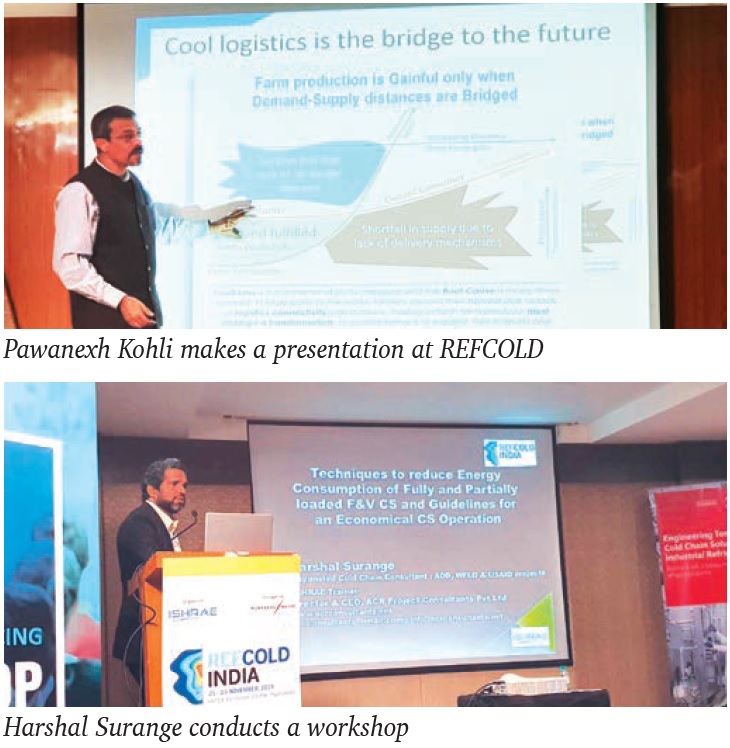By Harshal Surange and Arvind Surange
We wish all readers a very happy and prosperous new year 2020. With this issue, ‘Cold Chain CORNER’ completes 10 years of uninterrupted publication in Cold Chain. We
are happy to see that our efforts to keep the readers abreast with updated information and events that are happening in India and around the globe have been well received over this period of time, and we will continue striving to give our best to the industry. REFCOLD India 2019
Those readers who visited REFCOLD India 2019 at Hyderabad are aware that the show lived up to its name, and was significant in size in terms of the number and quality of visitors. There were many interesting and innovative products on display, and the show is slowly getting a significant hold on the refrigeration and cold chain industry. There was a separate Innovation Zone showcasing innovative products. A global poster design competition (wherein Harshal Surange was a jury member) received a good response, and the top 10 posters were on display. REFCOLD Emerson Awards continued to inspire an innovative approach in system and product design in the refrigeration and cold chain industry. Workshops and seminars were well attended and well received. Pawanexh Kohli gave a talk on the status of cold chain, emphasizing the requirement of a large number of pack houses and reefer transport units in the country.
There was a much larger number of reefer units at the show compared to the last year, which is a significant trend. Even small sized reefer vehicles were exhibited. A solar cold room was also on display, and attracted a lot of visitors.
One of the interesting products on display was a semihermetic ammonia compressor using an aluminium winding motor. Another was a dock leveller replacement solution fitted on the reefer van itself for unloading at places where dock levellers are not available but the gap between the plinth of the cold store and vehicle level has to be addressed.
Another annual event – India Cold Chain Show (ICCS) – was held in Mumbai, representing a number of sectors. It had a focus on the Pharma sector, and a seminar on the topic was held as a part of the event. Pack Houses
Now, we come back to the topic of pack houses. Taking forward the discussion with Pawanexh Kohli during his talk at REFCOLD, it is imperative for India to have a large number of pack houses. As per estimates, close to 70,000 pack houses are needed in the country. Some of the notable facts about pack houses are:
• Pack houses are, typically, designed for a particular produce, or similar kind of produce. Multiple product pack houses are also possible; however, the grading and sorting equipment (and/or washing and waxing equipment) varies with the produce.
• Most commodities that go into pack houses are, typically, seasonal and would make the pack houses usable for one or maximum two seasons. One product season (meaning the time period when it is harvested and is easily available) is, typically, two to three months.
• This means that pack house may be used only for three months of a year (or six months if there are two seasons) and cannot be utilized for the rest of the year.
• This makes investment in pack houses a real challenge.
• However, it is not the end of the road. There are many ways and means to counter this challenge:
•Have proper research and back end connects for getting the produce of a particular zone for the given season. There is a good chance that more than one product can be considered for the given zone.
•This will ensure that the pack house will operate for more than one or two seasons.
•If the pack house is meant for exports, considering the remuneration available, it may make sense to run it only for one season (grapes in Nashik are an example).
•For export purposes, it is normally recommended to go in for APEDA approved pack houses, meaning multiple norms laid down for export of goods from India need to be followed. This means additional investment. However, it is well worth it if the market linkage has been established.
•Consider the business model for the pack house and make sure that power consumed is at the minimum. This will ensure that operating costs are at a minimum.
•Pack houses meant for domestic despatches need not meet all the export norm requirements (though they are always good to follow), and this can save some cost.
•Depending on the product, processes such as pre-cooling, staging store, washing, waxing, grading, sorting and heating need to be considered.
• Principally, if the business model is in place, and product sourcing and selling points are established, it is worth getting into the pack house business.
The State of Maharashtra is expected to have some good schemes coming up for pack houses, and we will update readers on such schemes, once they come up.
Disclaimer: The information provided within this publication / eBook/ content is for general informational purposes only. While we try to keep the information up-to-date and correct, there are no representations or warranties, express or implied, about the completeness, accuracy, reliability, suitability or availability with respect to the information, products, services, or related graphics contained in this publication / eBook/ content for any purpose. Any use of this information is at your own risk.
 Youth
Youth
 Women
Women
 Research for Ishrae
Research for Ishrae







